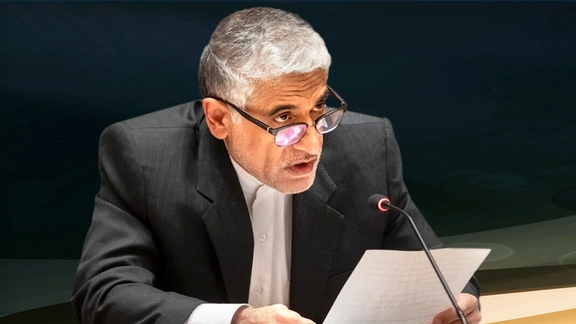US Does Not Deny Secret Meetings With Iran

The US State Department responding to reporters on Monday did not deny that its special envoy for Iran had secret meetings with Tehran’s ambassador to the UN.

The US State Department responding to reporters on Monday did not deny that its special envoy for Iran had secret meetings with Tehran’s ambassador to the UN.
The Financial Times last week reported that the special envoy Robert Malley met with Iran’s UN ambassador in New York several times to negotiate over American citizens held hostage by Iran.
A reporter asked State Department deputy spokesperson Vedant Patel during his regular briefing on Monday to confirm the report.
“I don’t have anything to announce on this front,” Patel responded.
He added, “As you’ve heard me say previously, we have the means to communicate with Iran and deliver messages to them that are in America’s interest to do so. We’re not going to detail the contents of those messages or the means of those deliveries. I don’t have anything additional to add there.” He refused to comment further.
There were many unconfirmed reports in May that Tehran and Washington were engaged in talks over releasing American hostages in exchange for some of Iran’s frozen funds abroad.
Iran International in January had reported the secret meetings and the State Department at the time did not deny or confirm the report using the same language Patel used on Monday.

Former spokesperson Ned Price in response to a question by Iran International said on January 18, “We have the means to deliver specific and firm messages to Iran when it is in America’s interest to do so.”
Iran International had asked the DoS that according to information it obtained, US Malley had met with Iran’s UN ambassador, Saeed Iravani, “at least three times in the last two months.”
“But we're not going to get into details about how we deliver these messages, except to say that we do so in close coordination with allies and partners.”
Regarding the content of these messages, Ned Price had said, “We have consistently conveyed three messages: stop killing peaceful protesters, stop selling weapons to Russia to kill Ukrainians, and release the Americans you’ve wrongfully detained. We also use any available opportunity to make clear that we will take necessary steps to protect American citizens.”
On the issue of American dual-nationals held hostage in Iran, no breakthroughs took place even if Malley met and negotiated with Iravani in the end of 2022 or even later. Three individuals, Siamak Namazi, Emad Sharghi and Morad Tahbaz have spent years in Iranian prisons charged with bogus accusations, without due process of law.
If Malley did meet Iravani face-to-face, it would be the first reported direct meeting between US and Iranian diplomats since the Biden administration assumed office and offered talks to revive the 2015 JCPOA nuclear deal. Iran has consistently refused direct talks with the United States, as a direct order by Supreme Leader Ali Khamenei.
During 11 months of nuclear negotiations in Vienna from April 2021 to March 2022, the United States was engaged on the side-lines. Messages were being carried by European Union representatives, as well as by Russian diplomats between the US and Iranian delegations.
In recent weeks, several politicians and pundits in Iran, allowed to speak in the local media, have urged direct talks with Washington to resolve the nuclear and other disagreements and relieve the pressure of US sanctions but so far Khamenei has not relented.
In an address to the pro-Israel advocacy group AIPAC on Monday, Secretary of State Antony Blinken said, "If Iran rejects the path of diplomacy, then, as President Joe Biden has repeatedly made clear, all options are on the table to ensure that Iran does not obtain a nuclear weapon."